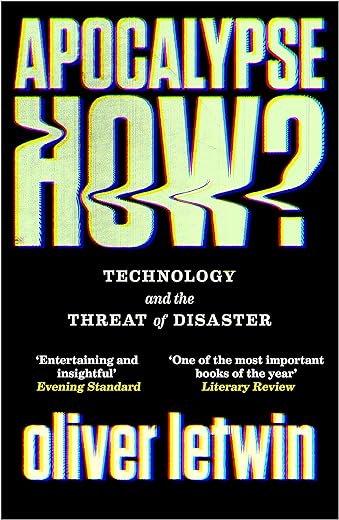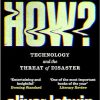Apocalypse How?: Technology and the Threat of Disaster
£4.10
‘Entertaining and insightful’ — Evening Standard
‘One of the most important books of the year… Compelling’ Jamie Bartlett, Literary Review
‘Timely’ — New Statesman
As the world becomes better connected and we grow ever more dependent on technology, the risks to our infrastructure are multiplying. Whether it’s a hostile state striking the national grid (like Russia did with Ukraine in 2016) or a freak solar storm, our systems have become so interlinked that if one part goes down the rest topple like dominoes.
In this groundbreaking book, former government minister Oliver Letwin looks ten years into the future and imagines a UK in which the national grid has collapsed. Reliant on the internet, automated electric cars, voice-over IP, GPS, and the internet of things, law and order would disintegrate. Taking us from high-level government meetings to elderly citizens waiting in vain for their carers, this book is a wake up call for why we should question our unshakeable faith in technology. But it’s much more than that: Letwin uses his vast experience in government to outline how businesses and government should respond to catastrophic black swan events that seem distant and implausible – until they occur.
Read more
Additional information
| Publisher | Atlantic Books, Main edition (5 Mar. 2020) |
|---|---|
| Language | English |
| File size | 1598 KB |
| Text-to-Speech | Enabled |
| Screen Reader | Supported |
| Enhanced typesetting | Enabled |
| X-Ray | Not Enabled |
| Word Wise | Enabled |
| Sticky notes | On Kindle Scribe |
| Print length | 217 pages |










by William H. Pickwell
A well written book presenting something that should concern us all. Total, or even partial, network failure will clearly have a major impact on how we live and survive. The need for a fallback system for networks is clear from this book but a fall back system is required for many more aspects of our lives, such as health care in case of pandemics or country wide food production should transport fail or borders close, is also needed. Perhaps MPs should read this book and consider the worst case.
by Ken Bell
Apocalypse How? arrived through my letterbox a little over 24 hours ago and I read it at one sitting, which is unusual for me these days. It is a short work, but a gripping one and the thesis within it is frighteningly plausible.
Oliver Letwin argues that internet domination and control will increase in the years to come, so any problem with the national grid will lead to a collapse of all communications. As we head towards a cashless economy, that will mean that people will not be able to buy the basic necessities that we all need.
Letwin uses an interesting format for his thesis. His work is part novella, and part analysis of the issues raised in that novella. So, for instance, the prologue is set on New Year’s Eve 2037 when the power goes down and takes all communications with it. Cars cannot run for very long as they are all battery-powered, the motorways are out of action as they are controlled by the internet, and the elderly will soon start to die as their carers cannot get to them because everything is stored on the cloud so nobody can find where they live, anyway.
The next chapter is the analysis: how plausible is the scenario? The answer is very plausible indeed, as Letwin demonstrates. Forty years ago we had telephones that did not need electricity to function. If the ‘phone lines were down we had the telegraph. We also had a postal service that delivered at least twice a day in the cities, so communication was possible in various ways.
Looking ahead, if everything is controlled by the internet, if and when the power goes out, pretty much everything stops working, which is what Letwin imagines will happen. There could be backup systems, but governments do not like spending money, so Letwin argues that these systems will not be built. The notion that something as basic as the power generation system could go down will be regarded as too fanciful for words, so the backup will not be built.
Apocalypse How? has been written as a warning not to do that. It remains to be seen if future governments will heed that warning, even though they should.
by Paul N Cornish
A trenchant and remarkably prescient analysis of our management of national crises and emergencies. Apocalypse How? should be read by those involved in reviewing the response to Covid-19 and in preparing for future ‘black swan’ events. Governments, writes Letwin (drawing upon Machiavelli) ‘should, for their own safety, take considerable pains to ensure that the safety of the populations over which they govern are not put at risk by events where no obvious external enemy can be identified as the prime cause.’
by R A S FORWARD
A weak story that wouldn’t fill a ladybird book, padded out with a cross between a boring dissertation and stolen government briefing papers
by Andrew Lord
Apocalypse How is a brilliant and chilling analysis of Britain’s lack preparation for crises. It gives deep insights into how government operates and why, when a crisis strikes, the chances are we will be caught off guard.
Having worked at the highest levels of the Conservative government Letwin knows his stuff. “In any country, it is incredibly difficult to raise sustained interest… about risks that are far off,” he explains. Yet, as technology makes us more and more reliant on electronic and the electrical grid, the risk of a disastrous meltdown increases. Letwin cleverly juxtaposes a future fictional scenario written as a thriller with his own analysis of the challenges and how they would be handled. Whether a flood, a pandemic or a blackout, this should be required reading for anyone intersted in keeping their family safe from sudden disaster.
by beingfair
Well structured and clearly written. Interesting technique alternating story chapter with non fiction detail. Relevant to crisis management in general
by Reviewer
Although not terribly well written (Letwin is a politician, not a writer) this book reveals how quickly and dramatically our civilisation will collapse in the aftermath of a Carrington Event. Worth reading.
by Gromit07
Bought this on the strength of a TV show interview where such things were discussed. It’s reasonably interesting but nothing leaps out as structured thoughts or ideas about the problem or its solution, if you follow this sort of subject. The book went to the charity shop after reading.